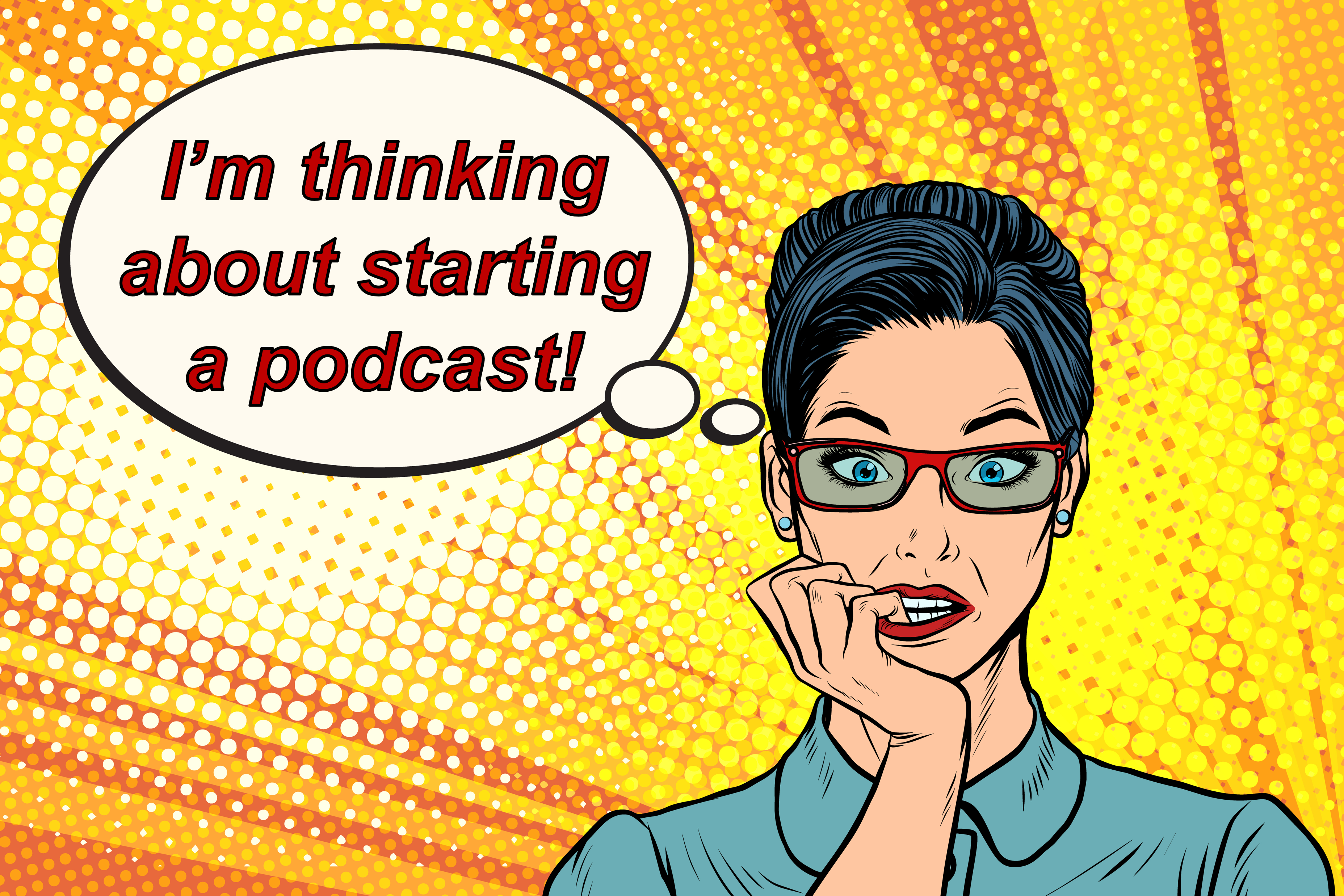
Tomorrow marks the beginning of what promises to be another content-packed Podcast Movement once again in Dallas. Alas, I will not be in attendance this time around. Seth Resler will once again reprise his “Podcast Makeover” session, a live critique of a couple of fledgling podcasts that has become a fixture at this fine conference.
Started by Dan Franks and Jared Easley in 2014 with the help of a Kickstarter campaign, Podcast Movement has become the go-to event for this community that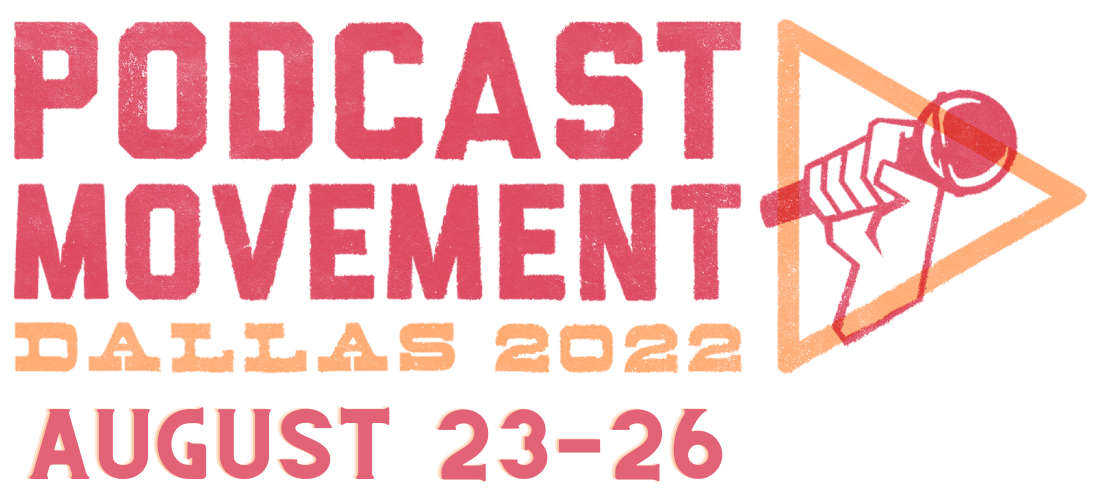 now boasts $2 billion in ad revenue. A few years back they started a second conference in L.A. called Podcast Movement Evolutions,, dedicated to the changing landscape of podcasting.
now boasts $2 billion in ad revenue. A few years back they started a second conference in L.A. called Podcast Movement Evolutions,, dedicated to the changing landscape of podcasting.
For today’s post, I’m taking some blogger’s license, and creating Podcast Movement Reckonings, an outside view of the medium with an emphasis on the changing perceptions of podcasting from the POV of the audience.
With each passing year and subsequent audience research, we learn more about this platform – why it generates loyalty and revenue on the one hand, but why it can frustrate and baffle at the same time. For millions, podcasting has brought great creativity and freedom. For some, podcasting has also attracted a steady income. And for the few, fortunes, when everything has fallen into place..
I have brand new data to share with you – some from AQ4, our new study of commercial radio air talent in the U.S. And other insights are from the still unreleased Public Radio Techsurvey 2022. (The stakeholder presentation is today, and the public unveiling takes place at PRPD’s Content Conference in New Orleans.)
Let’s look at some of the “podcast reckonings” that are in play as this medium continues to become a viable platform. Of course, many are through the radio lens.
Reckoning #1: Sheer numbers
Steve Goldstein wrote a great piece in his insightful “Blogstein” column yesterday. As he did back in April of last year, Steve and Podnews’ James Cridland totaled up the number of podcasts in a field of millions that have produced 10 or more episodes.
While no one seems to know exactly how many podcasts actually exist (Spotify claims 4.4 million; Podcast Industry Insights’ Daniel J. Lewis (see below) says it’s closer to half that many), nearly half have been abandoned by the side of the audio road, like an old couch.

Actually, that’s not a great analogy. At least an old piece of furniture got a lot of use. In the case of many of these productions, most never got off the ground. And the ones that have produced the prerequisite 10 episodes and one of them was produced in the past 10 days, the numbers get even smaller.
When Steve compared his new findings to 15 months ago, he made an interesting discovery. About the exact same number of podcasts made his “10/10 Rule” – about 156,000.
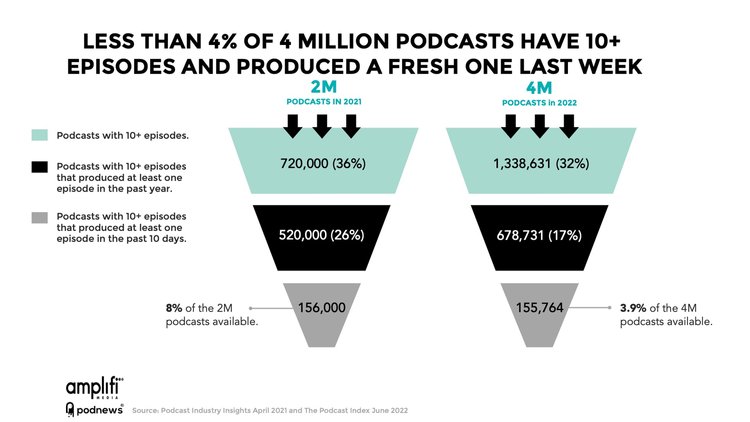
The difference is, there are twice as many podcasts now. So, maybe that suggests the number of industrious, dedicated, and talented people hasn’t changed. It’s just that they’re now tasked with creating compelling audio in a pool that’s become twice as littered with crap.
In podcasting, it’s not just enough to launch a podcast that is unique, compelling, and well-produced. Marketing it and attracting attention to it in an environment podcast savant Eric Nuzum once called a “flea market” is becoming a more daunting task.
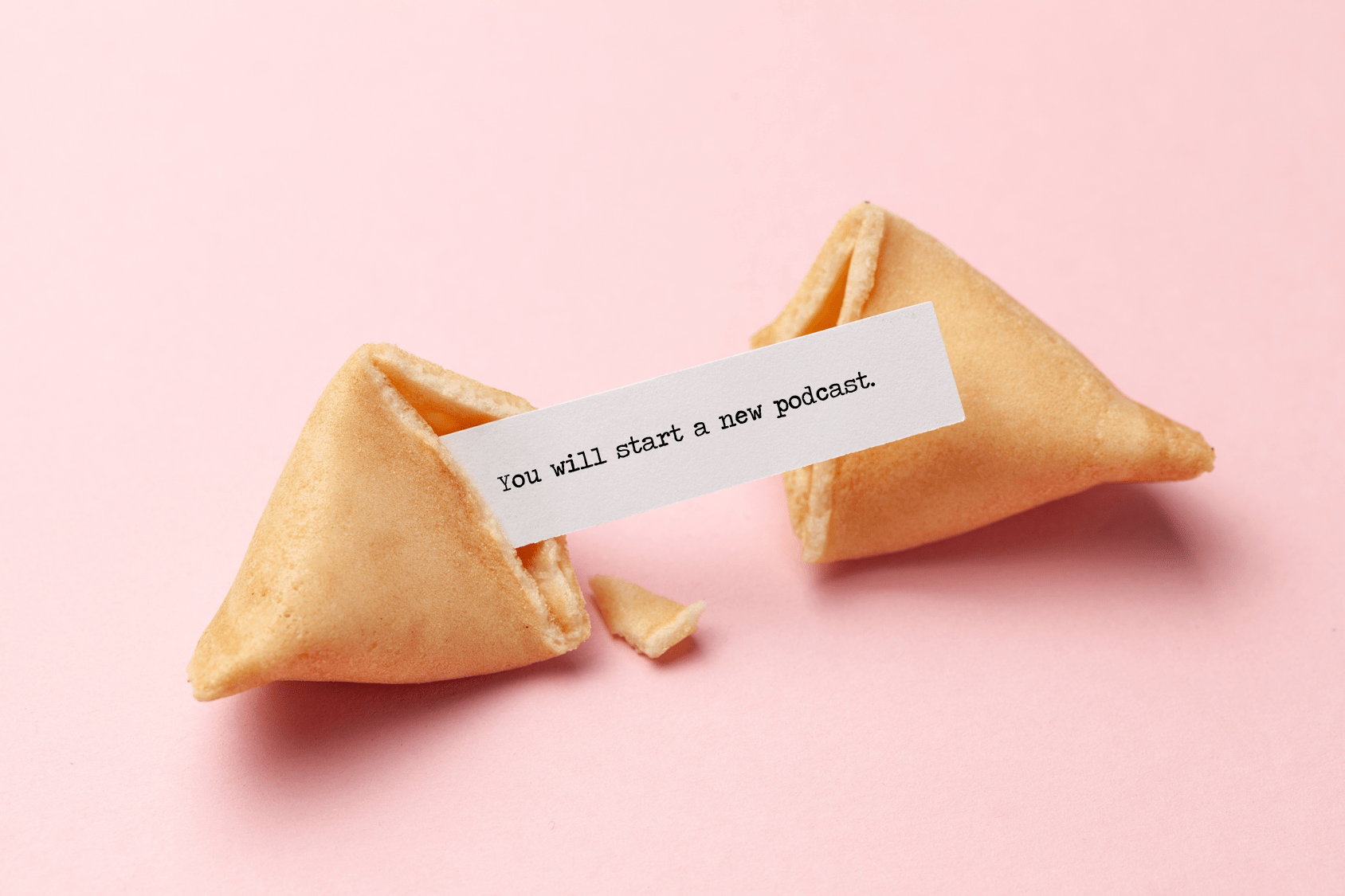
Reckoning #2 – Public radio’s opportunity…and challenge
Here in the U.S., the podcasting DNA has long-been centered in the public radio sector. Many of the best and most successful podcasts from the medium’s early days to right now have the public radio imprimatur. And many credit “Serial,” a podcast from the “This American Life” family, that elevated podcasting back in 2014 when it was first released.
And yet, even in public radio circles, I’m seeing signs of a slowdown.
Consider:
Over the past three surveys – in the heart of COVID and now in this survey – about the same percentage of public radio core fans listen to podcasts every week. Nearly four in ten fall into this category, while about three in ten self-classify as “podcast nevers” – those who have never indulged or have stopped listening altogether. This latter group is a stumbling block to podcasting’s growth and domination, but the industry still hasn’t solved this sampling problem.
Still, for public radio programmers and managers in particular, podcasting presents an opportunity, amplified by the fact that younger public radio listeners are far more likely to enjoy these on-demand productions than their Boomer parents and grandparents.
But the other side of the public radio coin is that podcast usage turns out to be erosive to radio listening – at least among core listeners to public radio stations.
This presents something of a dichotomy in that public radio content creators have been encouraged to produce podcasts that a) could likely detract from listening to real-time public radio programs, and b) may be very high quality, but are still difficult to fund and monetize.
When we ask public radio fans who listen to podcasts monthly or more often, the net:net when we calculate new listening versus lost listening to radio is a sobering net loss of 33%.
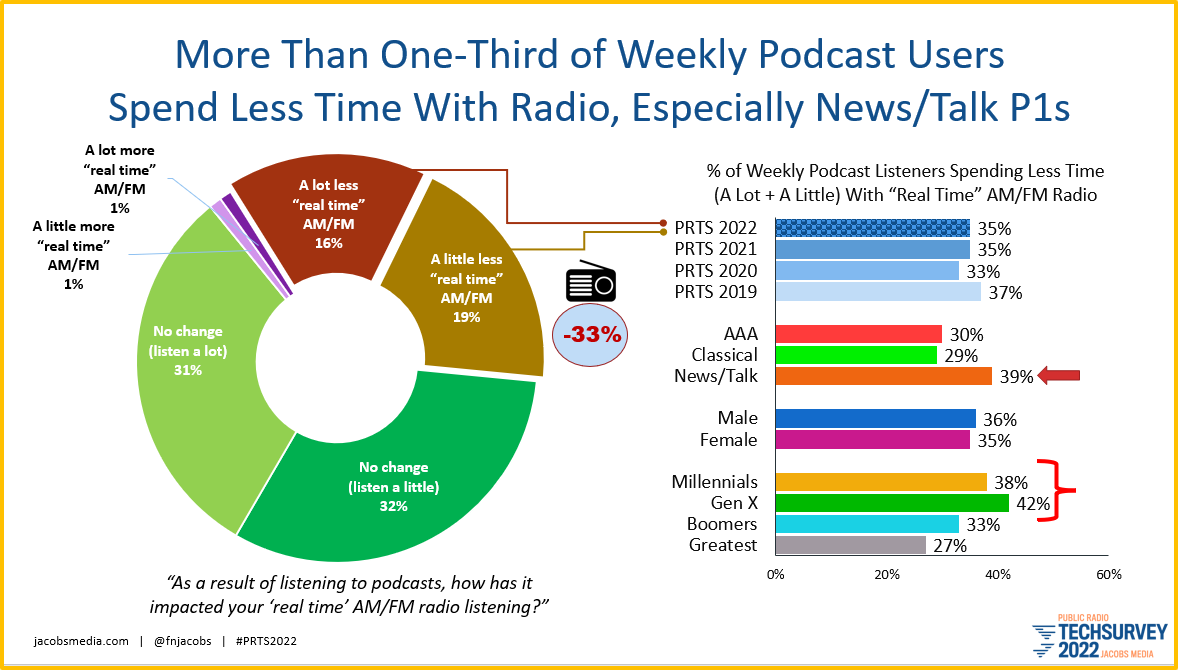
Reckoning #3 – The value of podcasting ads
From the beginning, there’s been a halo effect around ads inserted in podcasts. The contrasts between podcasting and commercial radio are obvious to even the most casual listeners: there are typically much fewer ads in podcasts than in radio shows, especially on commercial stations.
But there’s also been this notion that podcast ads carry more weight, and ultimately have more marketing impact. Podcasting pundits have long claimed commercials in these on-demand shows are more effective than the ads cluttering up commercial stations, even though both platforms utilize “live reads” by podcast and radio hosts respectively.
In Public Radio Techsurvey 2022, we asked our public radio core fans who listen to podcasts weekly or more often to make the comparison in an agree/disagree statement:
“I find ads in podcasts to be more credible than those I hear on radio stations.”
The result? By more than a 2:1 margin, these listeners disagree or disagree strongly with the statement. At least as it pertains to public radio, ads in podcasts don’t hold much of an edge: 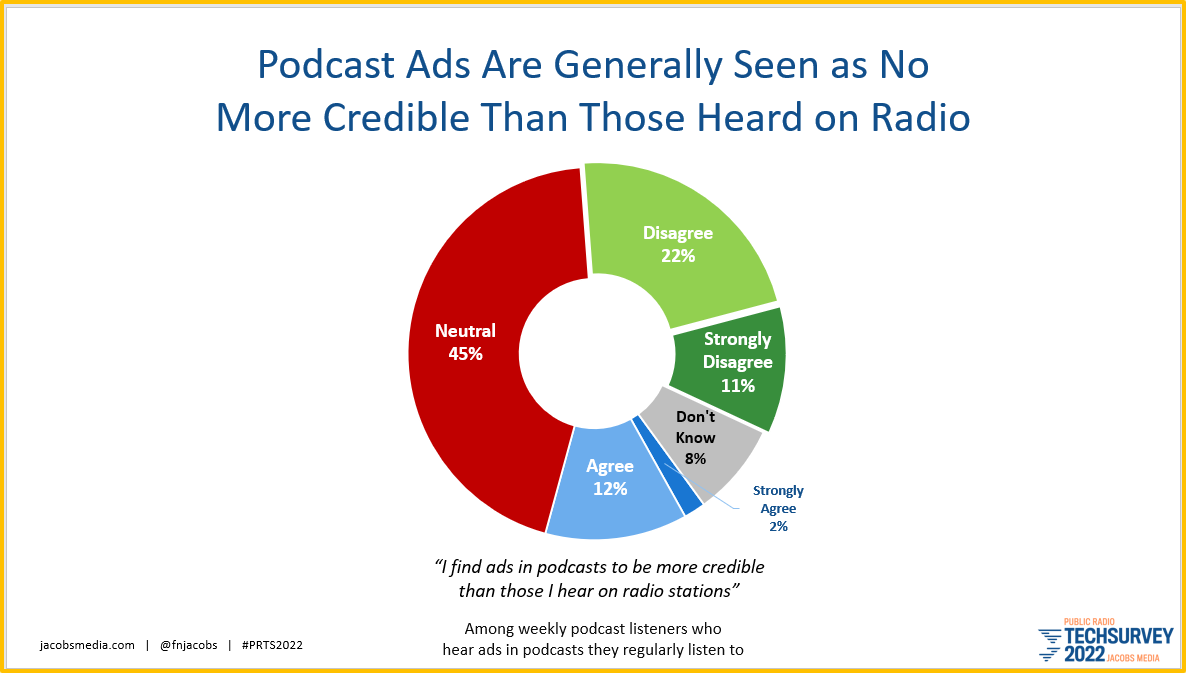
And here’s an interesting insight:
Even though podcasts carry considerably fewer ads than commercial radio programs, the repetitiveness of those commercials can get tedious.
In fact, more than six in ten of these same weekly podcast listeners agree or agree strongly they are experiencing fatigue from hearing the same ads over again:
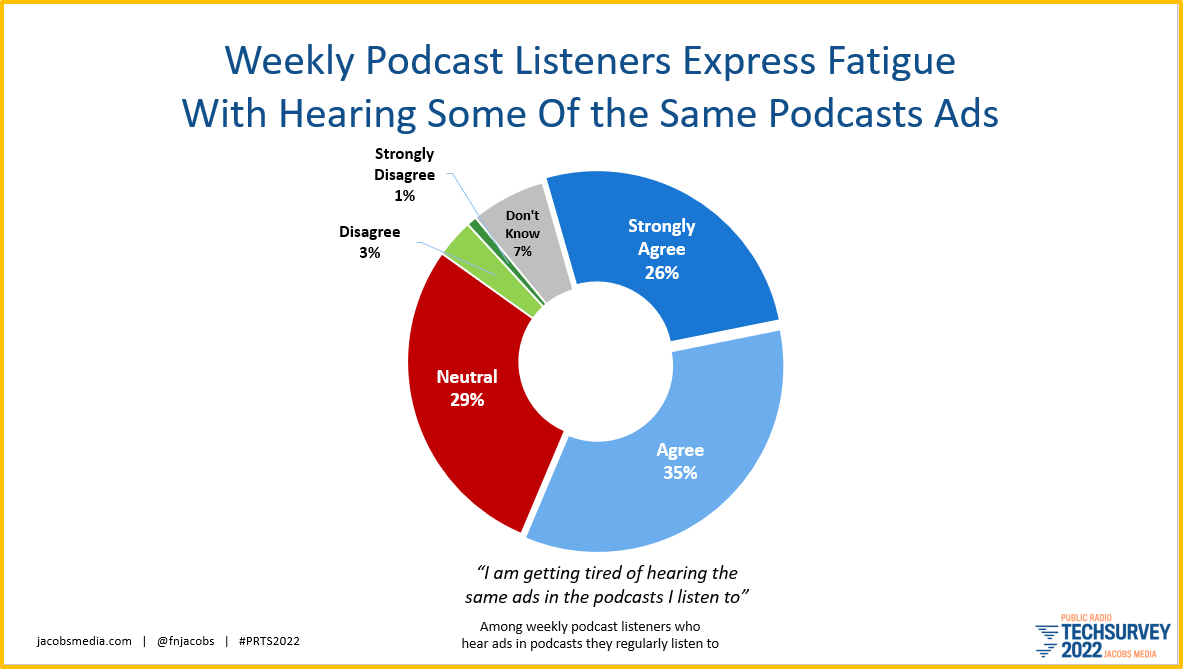
Holy Zip Recruiter!
Reckoning #4: Commercial radio talent struggle with podcasting
I mentioned our AQ4 study of air talent, conducted in July. All told, 750 respondents filled out our survey. And we learned that of those currently employed and on the air, nearly half are currently involved in a podcast (or are thinking of starting one/have one coming out soon). So, interest is there.
But when we asked those who actually produce a podcast, the end results are checkered. In fact, only 14% say they are monetizing their podcast. But better than six in ten are satisfied with their podcasting progress. Only a small number are considering throwing in the towel.
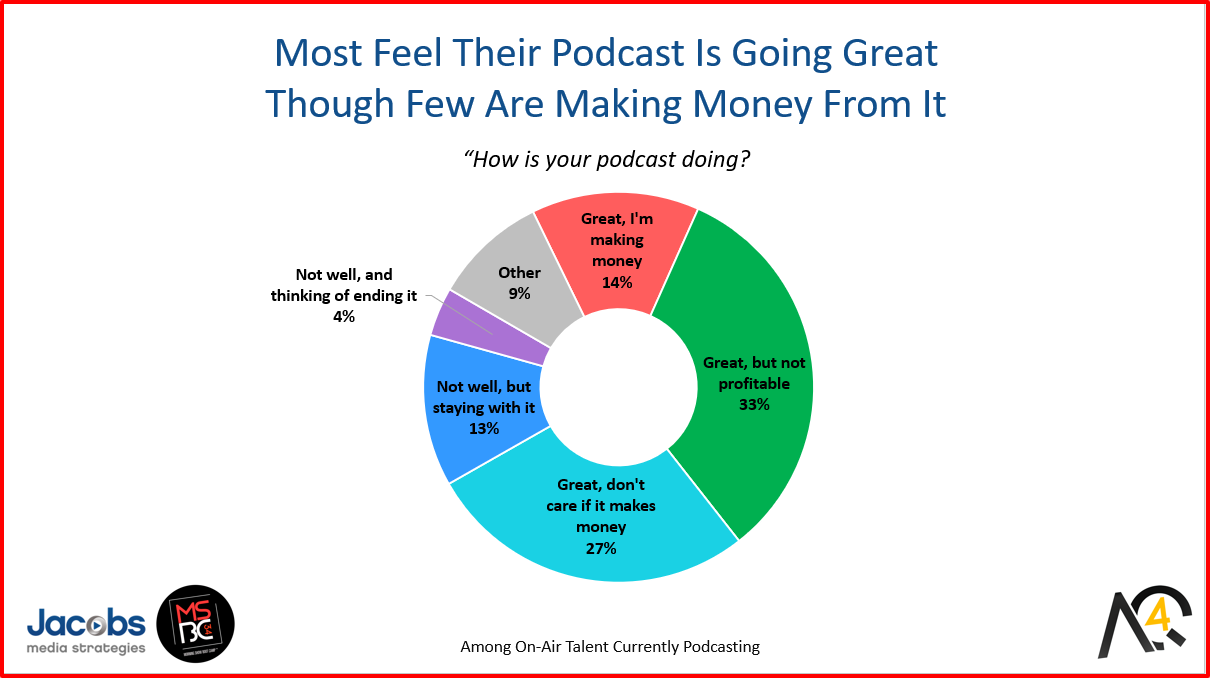
Reckoning #5: Public radio has an opportunity to go local with a podcast concept
Five years ago, the New York Times launched “The Daily” and has never looked back. The show chooses a current news story – abortion, climate change, the Mar-A- Lago documents – and provides an interesting, deep dive, usually in about the 20 minute range, to start out days.
“The Daily” has now spawned many similar podcasts that drop every weekday, generally focused on news and issues of the day. Overall, PRTS 2022 finds nearly half (49%) of public radio listeners who are weekly podcast consumers tuned in these daily shows every day. That’s impressive for a genre of podcasts that didn’t even exist just a few years ago.
But what about a local version of “The Daily,” produced by your hometown public radio station down at the left end of the radio dial? While a hypothetical question, more than six in ten express some level of interest, among those who already listen to podcasts at least weekly. Notably, nearly one-fifth (19%) say they’d be very interest in a local/regional daily podcast play.
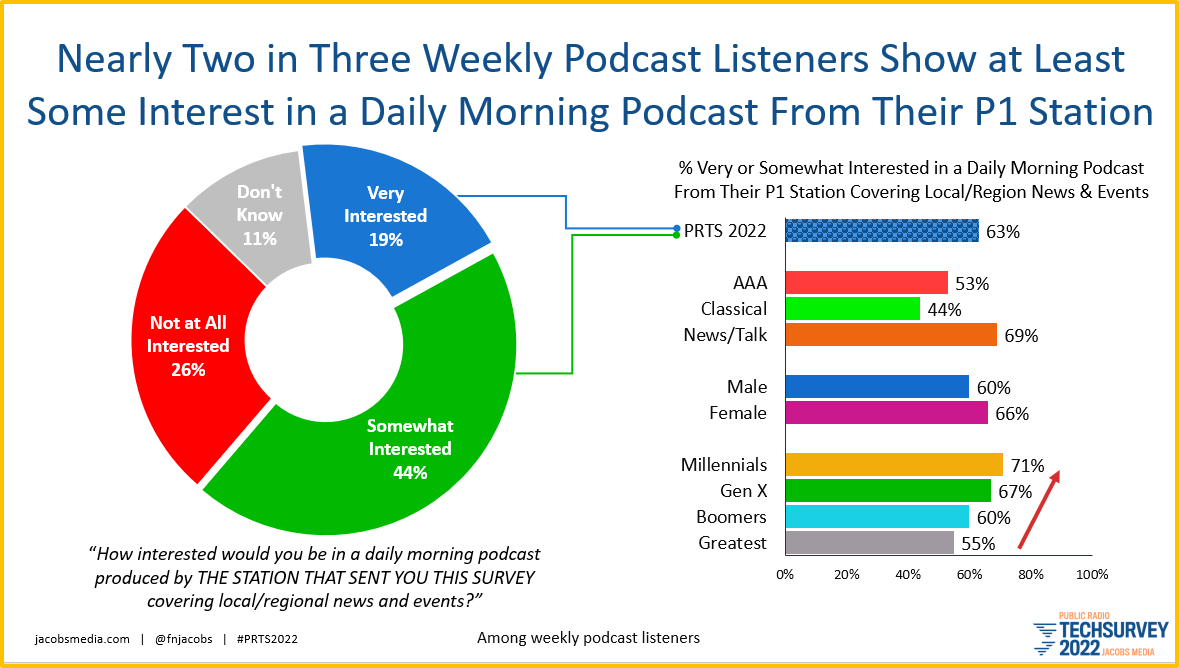
As you’d expect, fans of public radio news/talk stations are most intrigued by this podcast idea, as are progressively younger respondents.
The devil, as always, is in the details. At its roots, podcasting is the most egalitarian pursuit of digital self-expression, a chance for just about anybody with a mic and a little time. While the barrier to entry may be low, for millions, podcasting has become in exercise in futility for all but the elite sitting at the top of the pyramid.
Just because you can doesn’t mean you should. And just because you have doesn’t mean it will crack through. As we learned way back in Web 1.0, the barrier to entry is low. But perhaps as a result, the bar for discovery or success is very high.
If you’re running around the Sheraton this week in downtown Dallas, enjoy the “reckonings” at Podcast Movement. We all still have a lot to learn.
- Media And Technology In 2025: Believe It Or Not! - April 18, 2025
- In Radio, You Just Never Know - April 17, 2025
- The Secret To Making A Great Podcast (And Great Radio) - April 16, 2025




Do you ever ask if podcast listeners skip past podcast ads.
There is no question podcast ads can be both listenable and effective.
However, in the podcasts I listen to…
I may listen to the spot(s) once…
Then I’m jumping past it/them every time.
Marty, we did ask the question. And yes, most skip ’em.
Hello Fred, Long time since our time in the Las Vegas market. My experience with podcasting is the time it takes to build a loyal audience compared to terrestrial Radio. It is a long road to build an audience if you’re not a big name like Dees or Stern. Consistently produce, and they will come; patience. Review your unique IP hits to the podcast, and when they leave. If a lot drop at the same time, see the content you were providing at the time and re-evaluate the topic.
Thanks for the encouragement to fledgling podcasters, Lance. Great to hear from you.
One thing we all realize is that Podcasting is not Broadcasting. In today’s “on demand” world the listener can hear what he/she wants on his/her own terms. Broadcasting should deal with “the moment”. Remember time time when people were thrilled with hearing police broadcasts? You’d hear about a riot, an accident, a “10-20”-or whatever. I think the beauty of “broadcasting” is that it’s here. Now. Not yesterday, or last week. The issue with podcasting is that it’s not dissimilar to the daily newspaper. The sands trickle through the hourglass and the topic(s) can be come older and older. I like to read/watch/hear about radio and the media. My neighbor likes to read/hear/watch about money and investing. My other neighbor likes to read/watch/hear about being grumpy. That puts podcasting in the realm of the weekly magazine and the daily newspaper. The weekly newspaper. The monthly magazine. Podcasting is a different animal altogether than podcasting and the sooner we learn the goodness of “broadcasting” (NOW..right now.) vs. the goodness of podcasting (depth, detail, specificity) then we can move on. Attrition can come into play in those that hear podcasts listen less to broadcasts. Those who can fast forward through commercials will do that if they’re not entertaining or pertaining to the podcast content. Over 2 milion podcasts? The majority not making money? Broadcasting was invented to sell stuff. Crosley built and sold radios, so Powell put radio stations on the air so people would have a reason to have a radio. Audio entertainment is still very valuable to the general public, and it comes in more forms than ever. They’re all good, and have value. If you’re on someone’s P1 station, they’ll no doubt want to hear more from you. (Enter the podcast.) But the source of their interest is still what brought you there in the first place. Radio (broadcasting, that is) can be a boon to podcasts-as podcasts can help broadcasts if done right. There was a time when bridges were being blown up in Cincinnati after being replaced by newer structures. Airing those events live on radio made all the sense in the world and gave us the edge over our competition, something a podcast couldn’t do. A podcast could talk to the construction/demolition team about the process at length -something that a broadcast couldn’t do. Right now the broadcast is the megaphone that lures the listener to the podcast. Make them BOTH viable media -and the whole industry can thrive. I’m guessing right now, but I can hear the deals being made. “Buy a broadcast schedule, I’ll throw in a display ad on our website and give you 2 podcast spots too”.
Dave, you’ve gotten to the nub of the key differences, but how the two platforms might complement one another. But they are each very different from one another. I think a mistake that many made a few years ago was to assume that radio and podcasting are just different forms of audio. Oh, if it were only that simple. Thanks for making some great points.
I don’t know if what I’m about to say is nonsense.
When you work in radio, although audience measurements exist, you will never really know how many people are listening to you when you open the microphone.
Because of this, many radio people pay attention to calls from listeners, chat or greetings on the networks while on the air. There is always the illusion that someone is listening.
And, in the end, we all know that radio will always show hundreds or thousands of listeners during your air shift.
On the contrary, when doing a podcast you know the real numbers, and if the podcaster does not do well it can be very discouraging, leading to giving up before reaching a significant audience.
It can’t be easy to keep pushing if in the first 10 episodes you don’t get listeners worth the effort.
For this reason, probably, many give up.
As someone here said, the worlds of radio and podcasts are very different in their essence, and you have to learn to understand them.
I don’t think it’s nonsense at all. Radio broadcasters get more feedback than bloggers, especially at the beginning. It may be grossly inaccurate and more word-of-mouth than reality, but it can be encouraging. I also believe most podcasters put more thought into the show, and not as much into marketing and distribution. In the early days, it was less cluttered for podcasters. The good stuff stood out. Now, it’s a slog, and as you suggest, it can be discouraging. Thanks, Tito.